Behind the News
Behind the News: All the backstories to our major news this week
Published
1 year agoon
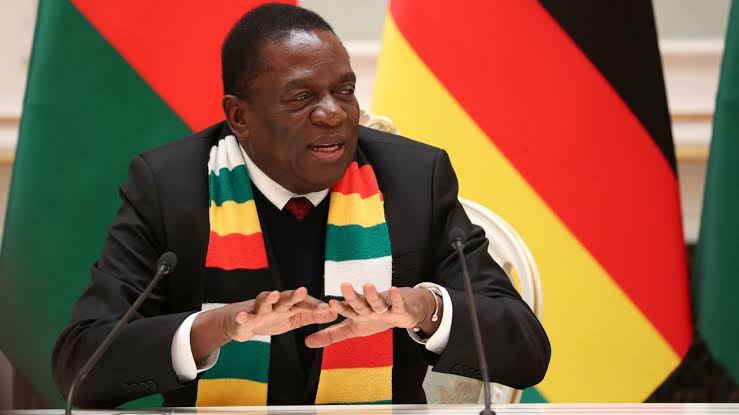
Over the past week, there were lots of important stories from around the African continent, and we served you some of the most topical ones.
Here is a rundown of the backstories to some of the biggest news in Africa that we covered during the week:
1. Mnangagwa wins Zimbabwe’s ‘tainted’ presidential election
Incumbent Zimbabwe President, Emmerson Mnangagwa, has emerged winner of the country’s presidential election held on Wednesday, but the conduct of the poll has continued to raise more questions.
The 80-year-old Mnangagwa, nicknamed “The Crocodile”, like most sit-tight African leaders, has been put under the spotlight by election observers, both locally and internationally, with the seeming general consensus being that the election fell below standards.
Some of the accusations include vote buying, voter intimidation and outright ballot box snatching.
First to raise the alarm was the leader of the European Union Observer Mission, Fabio Massimo Castaldo, who declared that the election “fell short of numerous regional and international criteria.”
Castaldo, who spoke to journalists, revealed a number of issues that tainted the election, including “the canning of opposition rallies, the denial of accreditation to several foreign media, the absence of voters’ names from the voter roll at their polling place, biased state media, and voter intimidation.”
Another election observer, Amina Mohamed, the head of the Commonwealth Observation Mission, also raised issues with the voting process which she said had “a number of important difficulties that affected the election’s credibility and transparency.”
Former Zambian Vice President, Nevers Mumba who headed the
SADC observation delegation, also expressed his dismay at the conduct of the election, saying that “certain aspects of the election fell short of the criteria of the Zimbabwean constitution, the electoral act.”
But despite the array of criticism that trailed the outcome of the poll, the Zimbabwe Electoral Commission said it would go ahead to announce the results before the deadline on Tuesday, and true to its words, declared the results Sunday.
2. Niger junta dares ECOWAS as Mali, Burkina Faso pledge military support
In line with the timeless maxim that “birds of a feather flock together”, the recalcitrant Niger military junta received further assurance of support from the leaders of Mali and Burkina Faso who pledged to lend their armies in the event of a military intervention by the Economic Community of West African States (ECOWAS).
The two countries, whose leaders also came to power through coups, announced in a joint statement their readiness to make available their forces if the newest junta in the region was attacked by the ECOWAS joint forces.
Despite a series of sanctions imposed by ECOWAS and several international bodies, including the threat of a military intervention, the Gen. Abdourahamane Tchiani-led coupists have continued to hold fort and it is left to be seen if the threats would lead to a war.
Efforts by ECOWAS to mediate in the crisis and help in restoring democracy and return the ousted President Mohamed Bazoum to power may have evaporated with the coup leaders bluntly refusing to cooperate, even advancing a proposal to be in power for the next three years.
3. Zambian entertainment scores another first
The entertainment industry in Zambia was further boosted as global streaming platform, Netflix announced that it would release the first feature film from the country on Sunday, August 27.
The release of the movie, “Can you see us?”, is coming on the back of the release of Africa’s first-ever original animated series “Supa Team 4,” which was created by Zambian writer, Malenga Mulendema, further lending credence to the potentials that abound in the eastern African country.
“Can you see us?” was written by one of Zambia’s most prolific and legendary script writers, Lawrence Thompson, and was filmed in Zambia in 2021 with a cast of over 150 actors and crew members, produced and directed by multiple award winning pan-African producer, Yasmin Dodia, another Zambian, which is also a testimony to the creative talents the country churns out.
A brief synopsis of the movie tells the true life story of a young boy named Joseph, who is a person living with albinism and the various difficulties he encounters as he grows older and how music and love help him to cope with them.
“It is a suspenseful tale of variety and self-discovery that is both inspirational and aspirational. The movie’s emotional appeal touches everyone’s heartstrings and inspires a shift in perception of others around the world who are albino. The story transcends the boundaries of culture, religion, race, and nationality,” Netflix said.
“Produced by Yasmin Dodia, one of few female pan-African producers with unwavering passion for African stories, her pursuit of excellence, and her ability to create authentic and impactful content that continues to inspire and captivate audiences while leaving a lasting impression.”
4. After glittering career, former Black Queens goalkeeper, Memunatu Sulemana, now lives in wooden shanty
The dream of every sporting athlete is to retire to the good life and reaping the fruits of their labour with their family.
But for Memunatu Sulemana, the former goalkeeper of the Ghana women national team, Black Queens, that dream of retiring in comfort has been truncated as she has reportedly fallen on hard times and is now living in a wooden shack alongside her family members in Kaneshie, a shanty town located within Accra, the country’s capital.
Sulemana, now 47, a veteran of three FIFA Women’s World Cup in 1999, 2003 and 2007, should have been one of the few retired female footballers in Africa to live in opulence after calling up time. But according to an investigation carried out by a media outfit in the country, the reverse is the case for the former player who was capped 30 times for her country.
During the encounter, the distraught ex-goal tender told the journalists that life had been unfair to her after she retired from the round leather game. Despite her decorated career, she revealed that she earned very little while playing football, leading to her current situation.
Sulemana’s situation has once again opened a pandora’s box on why many African athletes end up in penury at the end of their careers.
One is tempted to ask if these athletes earned so little, especially female athletes, or if they wasted their earnings on frivolous things or lacked the financial literacy to manage their fortunes.
Lots of questions beg for answers, including what their federations should do to help prevent recurrence or support those already down.
5. Controversy trails Nigeria’s new Culture Minister
Nigerians were woken up to a brewing controversy after a rights advocacy group, the Human Rights Writers Association of Nigeria (HURIWA), revealed that the new Minister of Arts, Culture and Creative Economy, Hannatu Musawa, was allegedly still observing her mandatory National Youth Service Corps (NYSC) scheme, a situation that should naturally have been brought to the fore during confirmation as Minister and possibly disqualify her.
In Nigeria, fresh graduates are mandated to serve the nation for one year before seeking for employment, but for Musawa, the rules were bent by President Bola Tinubu and the National Assembly which cleared her for the position.
While raising the alarm, the rights group said Musawa, who was posted to Ebonyi State for the mandatory service year, actually abandoned the scheme and went back to Abuja before before she was nominated for the ministerial position.
“Hannatu Musawa was confirmed by the senate without proper screening and sworn in by President Bola Ahmed Tinubu as minister of arts,” the group said in the statement.
It also wondered how her confirmation was made possible when there should have been a thorough scrutiny by the Department of State Services.
Another controversy around Musawa has to do with her age which should have disqualified her from participating in the scheme in the first place.
Those who know her well say she is about 45 years old, way above the maximum age of 30 for graduates who should be part of the scheme.
How President Tinubu will handle this controversy is a subject many Nigerians will not stop talking about for weeks and months to come.
You may like
-
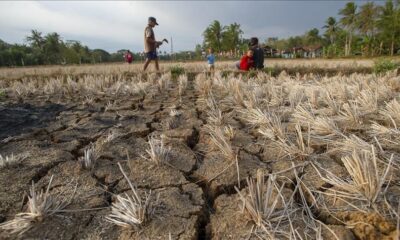

Zimbabwe at risk of fresh dry season after El Nino, WFP warns
-
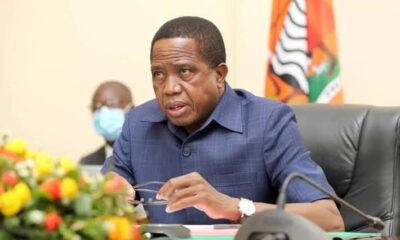

Zambia: Ex-President Lungu alleges political manipulation after barring from 2026 poll
-
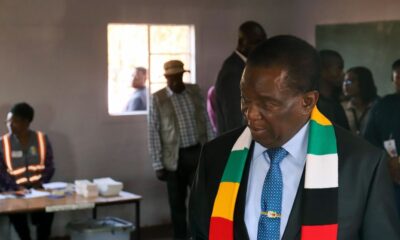

Zimbabwe aims to reconnect to global finance at debt summit
-
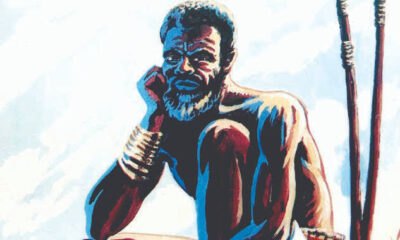

Zimbabwe calls on UK to return remains of 19th century warriors
-
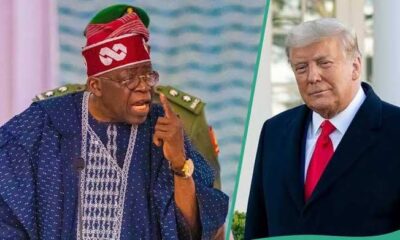

President Tinubu congratulates Trump on US election victory
-
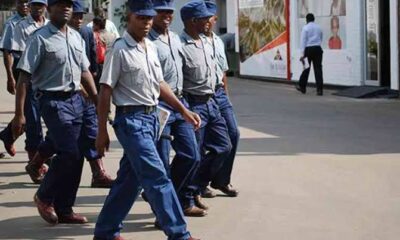

Zimbabwe bans police from using mobile phones while on duty
Behind the News
Behind the News: All the backstories to our major news this week
Published
3 months agoon
October 18, 2024
Over the past week, many important stories from around the African continent were published, and we served you some of the most topical ones.
Here is a rundown of the backstories to some of the biggest news in Africa that we covered during the week:
Another look at Africa’s debt crisis
Conversations around Africa’s public debt were on the table during the week as Achim Steiner, administrator of the United Nations Development Programme, stated on Monday that the world’s poorest countries were unable to meet sustainable development targets because they had to prioritise debt payments over investments.
Addressing a gathering in Hamburg, Steiner asserted that the world financial crisis was impeding countries’ ability to accomplish the objectives, which include eradicating hunger and poverty, increasing access to healthcare and education, providing sustainable energy, and protecting biodiversity.
Since the COVID-19 pandemic’s pervasive effects on economies, the majority of the continent’s nations have suffered with both internal and international debt; yet, few have achieved much in the fight for debt restructuring under the G20 framework.
Numerous African nations, including Egypt, Tunisia, Nigeria, Ghana, Zambia, and others, are struggling with significant foreign debt. Together with Zambia and Ghana, Ethiopia will be a part of a thorough restructuring known as the “Common Framework.”
At the opening ceremony of the annual African Union summit in Ethiopia last year, UN Secretary-General Antonio Guterres made the case for changes to the international financial system’s structure to better meet the requirements of developing nations.
Africa’s whole external governmental debt as of 2021 was 726.55 billion USD. The amount of foreign public debt increased from 696.69 billion dollars in comparison to the previous year.
Concerns are being raised by the rising debt levels in Africa, which could not only hinder economic growth but also make repayment nearly difficult for many of these nations. This begs an important question: When does debt stop being beneficial and instead start to negatively impact a nation’s economic performance?
Kenya remains committed to Haiti, but what does it stand to gain?
Kenya will support an international anti-gang effort in Haiti next month by dispatching an additional 600 police officers there. Haiti’s prime minister was in Kenya to expedite the deployment of the military.
At least eleven countries have pledged to send more than 2,900 soldiers to participate in the Multinational Security Support (MSS), led by Kenya.
Kenya, whose participation in international peacekeeping missions is longstanding, declared earlier this year that it would be deploying 1,000 police personnel, citing as a starting point its assistance to a bordering country.
Approximately 600,000 individuals have been internally displaced due to gang conflict, and hundreds of thousands of aspiring migrants have been deported back to Haiti, where approximately 5 million people are facing extreme famine. October marks the end of the mission’s first 12-month term. As gang violence worsened in 2022, Haiti turned for the first time to foreign assistance.
Nevertheless, it failed to identify a leader prepared to assume the helm and numerous foreign governments were reluctant to back the unelected administration in the desperately poor nation.
Kenya gains significant political value by sending its troops to Haiti on the international scene. Kenya has gained international recognition as a trustworthy ally that is eager to assist other nations. The mission opens up various opportunities. Prior to deployment, Kenyan law enforcement forces will receive specialist training and equipment. In the long term, this will increase the force’s capacity. Of course, there are monetary rewards as the participating nations receive allocations of resources. Because troops will receive additional pay, officers are very interested in being deployed overseas.
Cameroon: ‘Healthy’ Biya remains out of sight
Cameroon’s president, Paul Biya can now be likened to the proverbial cat with nine lives as the 91-year-old has remained “healthy” following latest reports of his death during the week. Rumours have been circulating about Cameroonian President Paul Biya’s possible death in a military hospital in France due to his extended absence. This rumour stems from Biya’s prolonged absence following the September China-Africa Summit when he was anticipated to head back to Cameroon almost away.
As of November 6, 1982, Biya, who is 91 years old, has been in office for 42 years. He is the oldest head of state in Africa, the longest-lasting non-royal national leader worldwide, and the second-longest serving president overall. According to rumours, Biya’s oldest son Franck Emmanuel Biya may be named as his replacement for “continuity” in France.
Since its political independence from France and Britain in the early 1960s, Cameroon has only had two presidents. The country is currently dealing with two serious crises: a deadly Boko Haram insurgency in the north and a separatist conflict that has claimed thousands of lives.
President Biya is one of several long-serving African leaders, including Yoweri Museveni of Uganda, who has been in office since 1982, and Teodoro Obiang Nguema Mbasogo of Equatorial Guinea, Rwanda’s Paul Kagame is also gradually evolving into the group.
Things get tougher for embattled Kenyan Deputy President
During the week, the deputy president of Kenya was impeached by the National Assembly due to charges of corruption and abuse of power. In a vote held Tuesday night, lawmakers decisively decided to remove Rigathi Gachagua from office. The Senate will now decide what will happen to the deputy president.
Parliament adopted a proposal to remove Kenya’s deputy president from office, and on Wednesday, the matter was brought to the Senate for consideration. The National Assembly heard a nearly ninety-minute defence of troubled deputy president Rigathi Gachagua and his allies prior to the vote.
A surge of protests targeting President Ruto’s government has been occurring in Kenya over the last four months due to accusations of corruption made by certain lawmakers and government officials. High taxation and the parliament’s purported inability to act independently of the president were other issues that Kenyans objected to. Gachagua refutes the accusations made by certain lawmakers, who claim that the deputy president assisted in planning rallies against the government.
He supported Ruto in his election victory in 2022 and assisted in obtaining a sizable portion of the vote from the populated central Kenya region. Gachagua, however, has mentioned feeling marginalised in recent months, despite extensive claims in the local media that he and Ruto have strained political ties.
After widespread protests over unpopular tax increases in June and July that claimed more than 50 lives, Ruto sacked the majority of his cabinet and appointed members of the main opposition.
Gachagua infuriated many in Ruto’s coalition by comparing the government to a business and implying that people who supported the coalition had first claim to development projects and jobs in the public sector. Ruto has not yet publicly commented on the impeachment proceedings.
Behind the News
Behind the News: All the backstories to our major news this week
Published
4 months agoon
October 3, 2024
Over the past week, many important stories from around the African continent have been published, and we have served you some of the most topical ones.
Here is a rundown of the backstories of some of the biggest news in Africa that we covered during the week:
Musings on CBN rates across Africa: Ghana, Nigeria, and South Africa
During the week, many African countries announced monetary policy decisions. The Central Bank of Nigeria decided unanimously on Tuesday to raise its benchmark interest rate by an additional 50 basis points, to a new record high of 27.25%. This is the sixth hike in a row this year. The decision was made in an effort to reduce inflation, strengthen the naira, and draw in capital. Governor Olayemi Cardoso reaffirmed the bank’s commitment to controlling inflation and underlined how several rate hikes have contributed to its moderation.
Nigeria’s West Africa neighbour followed suit on Friday as the Bank of Ghana reduced its benchmark monetary policy rate by 200 points to 27% at a normal meeting. With inflation having slowed and disinflationary pressures mounting, this is the first decline in eight months and the steepest since March 2018. August 2024 saw a fifth consecutive month of decline in Ghana’s annual consumer inflation, which was still much higher than the central bank’s medium-term target range of 6% to 10%. The country’s annual inflation rate dropped to a nearly two-and-a-half-year low of 20.4% from 20.9% in July.
A week prior, as anticipated, the South African Reserve Bank decreased its benchmark interest rate by 25 basis points to 8% after holding seven consecutive meetings at a 15-year high of 8.25%. As price pressures decreased, the SARB is loosening policy for the first time since the epidemic in 2020
As monetary varying shifts across the continent continue, African nations are still facing numerous severe shocks and significant structural challenges, such as rising food and energy prices brought on by geopolitical tensions like Russia’s invasion of Ukraine, climate issues that impact agriculture and energy production, and ongoing political instability.
Africa’s real GDP growth slowed to 3.1% in 2023 from 4.1% in 2022 as a result of this difficult climate. With growth predicted to reach 3.7% in 2024 and 4.3% in 2025, the economic picture is projected to improve going ahead, underscoring the resilience of African countries.
Zambia and its post-drought plans
Zambia’s finance minister, Situmbeko Musokotwane stated on Friday that the nation intends to quickly recover from its worst drought in living memory and cut its budget deficit in half the following year.
The minister stated in a budget address that the copper producer hopes for a 6.6% growth in 2025, as opposed to a projected 2.3% increase in 2024. The country is aiming for a speedy recovery. as the government crop assessment data shows that over nine million people are affected in 84 of the 117 districts after suffering through the driest farming season in over forty years, which has led to considerable crop losses, an increase in livestock deaths, and worsening poverty,
Real GDP increased gradually between 2022 and 2023, from 5.2% to 5.8%. The supply side was driven by mining and quarrying, wholesale and retail commerce, and agriculture; the demand side was driven by consumer and business spending. Food prices, transit expenses, and the nominal exchange rate are the key drivers of inflation, which is expected to remain elevated and reach 11.0% and 10.9% at the end of 2022 and 2023, respectively.
The economic challenges faced by Zambia are exacerbated by the drought, especially when considering its debt load. Its debt restructuring talks under the G20 Common Framework have progressed far more slowly than was originally anticipated when the Common Framework was first proposed.
In 2017, Zambia was placed under debt distress, and as a result, non-concessional lending from multilateral development banks was discontinued. It’s possible that by overestimating sovereign risks, the main credit rating firms exacerbated the debt crisis and dealing with a post-drought crisis might just be another “too high hurdle”
As the World Bank and Uganda LGBTQ saga continues
The World Bank is taking more action in support of Uganda’s LGBTQ community. The global lender announced on Wednesday that it is implementing steps to guarantee that lenders to Uganda are not subjected to discrimination due to a severe anti-gay law. According to a World Bank representative, both new and continuing projects would be subject to the procedures, which also include an impartial monitoring system to guarantee compliance.
Same-sex partnerships are forbidden and punishable by life in prison; similarly, anyone convicted of “aggravated homosexuality” faces the death penalty. The Anti-Homosexuality Act (AHA) was passed by Uganda, a largely conservative nation, in May of last year and it has led to considerable Western censure and US penalties.
Other than Uganda, several African nations have strict laws that discriminate against individuals who identify as LGBTQ. Hakainde Hichilema, the president of Zambia, issued a warning in March to supporters of the LGBTQ movement to stop endorsing homosexuality. He also asked that Zambia “maintain laws that abhor alien orientations like gayism and lesbianism.”
South Africa, which has a constitution that forbids discrimination based on sexual orientation, was the first and only African nation to legalise same-sex marriage in 2006. Some African nations, such as Angola, Mozambique, Botswana, Lesotho, Mauritius, and Seychelles, have laws that are favourable to the continent’s population but Uganda appears to be unbothered or tempted despite the many causes and costs of its anti-gay stand.
Ahead of Tunisia’s presidential election
During the week, another Tunisian presidential candidate Ayachi Zammel was convicted and sentenced to six months imprisonment for using “fraudulent certificates” as opposition voices in the North African country continue on attack as President Saied positions himself for what is likely to be a reelection, as all but one of the opposition candidates are either incarcerated or have had their eligibility ruled invalid by the Tunisian electoral commission.
On September 19, a third candidate who had received the election commission’s approval was sentenced to 20 months in prison. Saied, who is currently running for reelection for a second five-year term, was originally elected in 2019 as an anti-establishment candidate who pledged to combat poverty and eradicate corruption. However, in 2021 he declared that he would rule by decree after overthrowing Mohamed Ennaceur and the elected parliament, a move denounced as a coup by the opposition and the international community.
Additionally, he has deployed more oppressive strategies, which may indicate that he is not confident in his ability to win with conviction. His severe actions could indicate a new stage in Tunisia’s democratic backsliding and foreshadow more crackdowns and turmoil during an inevitable second term.
Meanwhile, concerns exist over potential voting turnout as well. Under Saied, Tunisia has conducted three elections, with dismal voter turnout in each. Less than one-third of voters cast ballots in favour of a new constitution that solidified Saied’s power and overthrew the 2014 charter in July 2022. After Saied dismissed the previous legislature in December 2022, only 11% of voters cast ballots for new members of parliament, which is among the lowest turnout percentages ever recorded in a national election worldwide. The next December, Saied called elections for a new second house of parliament, repeating this dubious performance.
EDITOR’S PICK


Nigeria: Marketers predict further price cut as another refinery begins operations
Oil marketers and the Nigerian Midstream and Downstream Petroleum Regulatory Authority expect refined petroleum product prices to reduce as another...


Kenya: Consumer inflation rises to 3.0% from 2.8%
Kenya’s statistics agency said on Tuesday that Kenya’s consumer price inflation increased slightly to 3.0% year-over-year in December from 2.8%...


South Africa’s Transnet’s half-year deficit hits $117m
Transnet, a state-owned logistics company in South Africa, announced on Tuesday that it had lost 2.2 billion rand ($117.48 million)...


Nigeria, China extend $2bn currency swap deal
A 15 billion yuan ($2 billion) currency-swap arrangement between China and Nigeria has been extended to boost investment and commerce...


Egypt’s central bank maintains overnight rates
As anticipated, Egypt’s central bank has maintained its overnight interest rates, stating that although inflation was predicted to drop significantly...


Illicit flows cost Nigeria, others $1.6bn daily— AfDB
According to the African Development Bank (AfDB), illicit money flows and profit shifting by multinational corporations doing business in Africa...


‘Don’t start what you can’t finish’, ex-Nigerian official replies President Tchiani
Former Nigerian Aviation Minister, Femi Fani-Kayode, has told President Abdourahamane Tchiani of Niger Republic to refrain from making infantile and...


Again, Starlink raises prices of its services in Nigeria
Elon Musk’s satellite internet service provider, Starlink, has again jacked up the prices of its services in Nigeria after an...


Former President of Moroccan club Raja sentenced to 3 years in prison
The former President of Moroccan top club, Raja Casablanca, Mohamed Aouzal, has been sentenced to three and a half years...


Zambia announces second case of Mpox as country battles cholera outbreak
The Zambian Ministry of Health has reported a second case of Monkeypox, popularly known as Mpox, in Kitwe region of...


